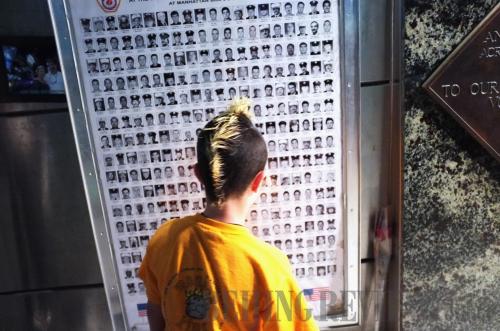|
 |
|
REMEMBERING HEROES: A boy looks at the faces of firefighters killed in the September 11, 2001 terrorist attacks at Ground Zero ahead of the 10th anniversary of the attacks (CFP) |
"How can you heal from that? You don't heal from that," Juana Lomi said to Beijing Review. She was a paramedic working for the New York Downtown Hospital when the World Trade Center was attacked, and was among the first to arrive on the scene to help and rescue people there.
"I had to live through the scene of what happened, plus the aftermath, the cleanup," Lomi said. "There were a lot of moments of nightmare, a whole year of not being able to sleep, a whole year of remembering the firefighters who used to work across the street and lost their lives," she said.
But life has to go on. So "you learn to embrace the situation and you learn to live with it and manage to do the best you can," said Lomi.
High alert
A lot has changed since the tragedy. And yet some things remain the same, one of which is the constantly repeated question deep in the heart of every American: "Are we safer?"
"Our homeland is more secure than it was 10 years ago, and, indeed, more secure than it was two years ago," said Secretary of the U.S. Department of Homeland Security (DHS) Janet Napolitano in her State of Homeland Security speech in January.
The DHS launched a national campaign called "if you see something, say something" in July last year, aiming to raise public awareness of indicators of terrorism and violent crime and to emphasize the importance of reporting suspicious activity.
It was launched in conjunction with the rollout of the Nationwide Suspicious Activity Reporting Initiative, a program led by the U.S. Department of Justice to collect and share reports of suspicious activity by people in the country.
New York City's Metropolitan Transportation Authority began using the "see something, say something" slogan in 2003. The program has been credited with effectively thwarting an attempted car bombing in the city's Times Square in May 2010. A T-shirt vendor saw smoke coming from a vehicle and reported it to the police, who then prevented the explosion from happening.
"Only a 'whole-nation approach' will bring us to the level of security and resilience we require," Napolitano said. "Real security requires the engagement of our entire society, with government, law enforcement, the private sector, and the public all playing their respective roles."
The United States has taken important steps to implement new security measures during the past decade, including the deployment of new technology in aviation security and the increase of intelligence sharing and cooperation within the government. These measures have proved to be effective as there has not been another major successful attack on the United States since the September 11 attacks.
Michael Chertoff, former DHS Secretary, said in a National Public Radio program in June that the United States has improved a lot in recent years in integrating intelligence. "We're simply much better now in not only collecting information, including open-source information, but in integrating it and making use of it in decision-making in real time," said Chertoff.
And that has yielded benefits. The killing of Al Qaeda leader Osama bin Laden and the improved ability to detect travelers to the United States through airports are testament to the United States' enhanced capability of intelligence collection, he said.
Partly thanks to intensive intelligence operations inside Pakistan, the United States has made major strides against Al Qaeda in the past months. The U.S. raid that eliminated bin Laden in May and the drone strike that killed the organization's new second-in-command Atiyah Abd al-Rahman in August have delivered heavy blows to Al Qaeda.
But despite the U.S. Government's antiterrorism efforts, Americans expressed mixed feelings on the current security situation of their homeland. The country may be safer now, but it's far from safe.
A recent online nationwide survey commissioned by the Federal Signal Corp. and conducted by Zogby International regarding Americans' public safety concerns 10 years after the September 11 terrorist attacks found half of Americans feel they are less safe today than they were prior to the September 11 terrorist attacks.
"I don't know how much safer the world has become. I just don't see it," Lee Ielpi said to Beijing Review. Ielpi is a former New York City firefighter who lost his firefighter son in the September 11 terrorist attacks. He has since worked to bring comfort to families of victims and co-founded the Tribute WTC Visitors Center that aims to educate people about the whole tragic event and terrorism.
We cannot just depend on airport X-rays, Ielpi said. "It might be a little safer flying in, but homegrown terrorists are here. We have to be concerned about that," he added.
| 